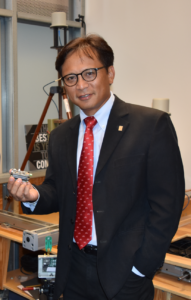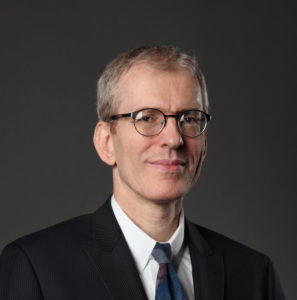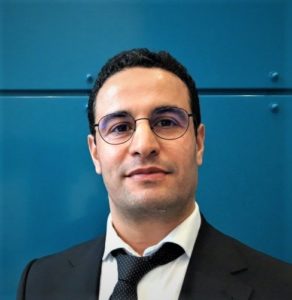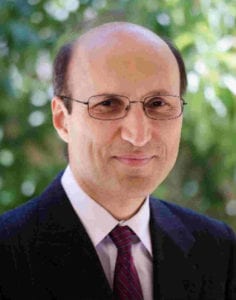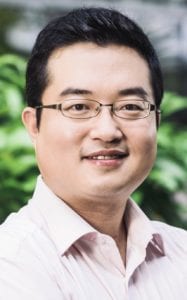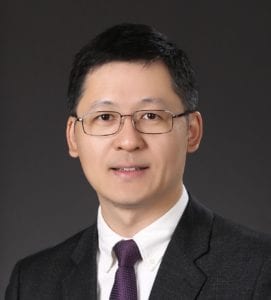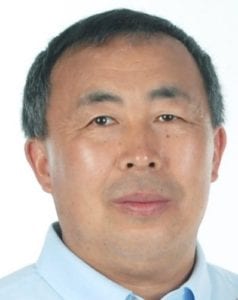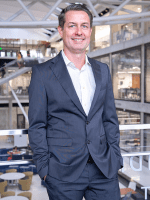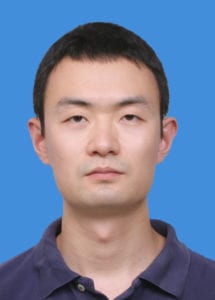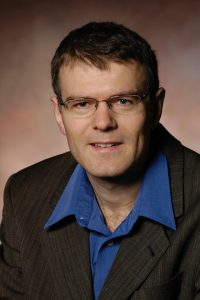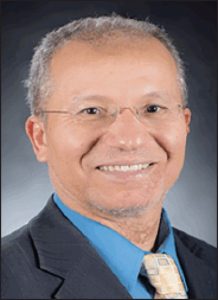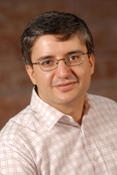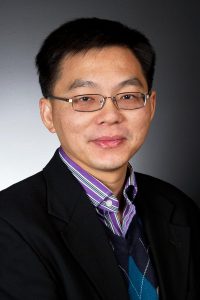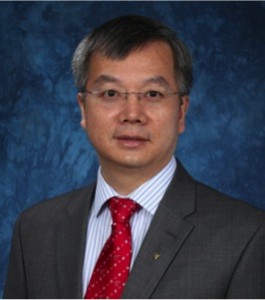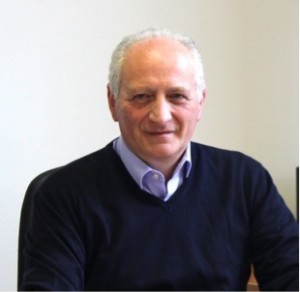2023 WTC Recognition Award
Ross Murch, Hong Kong University of Science and Technology (HKUST), Hong Kong
Ross Murch received the bachelor’s and Ph.D. degrees in electrical and electronic engineering from the University of Canterbury, Christchurch, New Zealand, in 1987 and 1990, respectively. He was the Department Head of the Department of Electronic and Computer Engineering, Hong Kong University of Science and Technology (HKUST), Hong Kong, for two three-year terms from 2009 to 2015. He is currently the Chair Professor with the Department of Electronic and Computer Engineering and an IAS Fellow with the Institute of Advanced Study, HKUST. His unique expertise lies in his intradisciplinary knowledge of both wireless communication systems and electromagnetics. 20 patents. He has successfully supervised over 50 research students. His research focuses on creating new RF wave technology for making a better world and this includes areas such as the Internet of Things, RF imaging, RF sensing, RF navigation, ambient RF systems, energy harvesting, electromagnetic information theory, 6G, multiport antenna systems, and reconfigurable intelligent surfaces. Dr. Murch is a fellow of Institution of Engineering and Technology (IET) and The Hong Kong Institution of Engineers (HKIE). He has won several prizes including three teaching awards. He has been involved in IEEE activities including being an Area Editor of IEEE Transactions on Wireless Communications and the Chair of the IEEE Technology Committee on Wireless Communications.
Shuguang Cui, The Chinese University of Hong Kong, Shenzhen, China
Shuguang Cui received his Ph.D in Electrical Engineering from Stanford University, California, USA, in 2005. Afterwards, he has been working as assistant, associate, full, Chair Professor in Electrical and Computer Engineering at the Univ. of Arizona, Texas A&M University, UC Davis, and CUHK at Shenzhen, respectively. His current research interests focus on the merging between AI and communication networks. He was selected as the Thomson Reuters Highly Cited Researcher and listed in the Worlds’ Most Influential Scientific Minds by ScienceWatch in 2014. He was the recipient of the IEEE Signal Processing Society 2012 Best Paper Award. He is a member of the Steering Committee for IEEE Transactions on Big Data and the Chair of the Steering Committee for IEEE Transactions on Cognitive Communications and Networking. He is also the Vice Chair of the IEEE VT Fellow Evaluation Committee and a member of the IEEE ComSoc Award Committee. He was elected as an IEEE Fellow in 2013, an IEEE ComSoc Distinguished Lecturer in 2014, and IEEE VT Society Distinguished Lecturer in 2019. In 2020, he won the IEEE ICC best paper award, ICIP best paper finalist, the IEEE Globecom best paper award. In 2021, he won the IEEE WCNC best paper award. In 2023, he won the IEEE Marconi Best Paper Award, got elected as a Fellow of both Canadian Academy of Engineering and the Royal Society of Canada, and starts to serve as the Editor-in-Chief for IEEE Transactions on Mobile Computing.
2023 WTC Outstanding Young Researcher Award
Haibo Zhou, Nanjing University, China
Haibo Zhou received the Ph.D. degree in information and communication engineering from Shanghai Jiao Tong University, Shanghai, China, in 2014. From 2014 to 2017, he was a Postdoctoral Fellow with the Broadband Communications Research Group, Department of Electrical and Computer Engineering, University of Waterloo. He is currently a Full Professor with the School of Electronic Science and Engineering, Nanjing University, Nanjing, China. He was a recipient of the 2019 IEEE ComSoc Asia–Pacific Outstanding Young Researcher Award, 2023-2024 IEEE ComSoc Distinguished Lecturer, and 2023- 2025 IEEE VTS Distinguished Lecturer. He served as Track/Symposium Co-Chair for IEEE/CIC ICCC 2019, IEEE VTC-Fall 2020, IEEE VTC-Fall 2021, WCSP 2022, IEEE GLOBECOM 2022, IEEE ICC 2024. He is currently an Associate Editor of the IEEE Transactions on Wireless Communications, IEEE Internet of Things Journal, IEEE Network Magazine, and Journal of Communications and Information Networks. His research interests include resource management and protocol design in B5G/6G networks, vehicular ad hoc networks, and space-air-ground integrated networks.
2023 WTC Service Award
Lajos Hanzo, University of Southampton, UK
Lajos Hanzo received his Master degree and Doctorate in 1976 and 1983, respectively from the Technical University (TU) of Budapest. He was also awarded the Doctor of Sciences (DSc) degree by the University of Southampton (2004) and Honorary Doctorates by the TU of Budapest (2009) and by the University of Edinburgh (2015). He is a Foreign Member of the Hungarian Academy of Sciences and a former Editor-in-Chief of the IEEE Press. He has served several terms as Governor of both IEEE ComSoc and of VTS. He has published 2000+ contributions at IEEE Xplore, 19 Wiley-IEEE Press books and has helped the fast-track career of 123 PhD students. Over 40 of them are Professors at various stages of their careers in academia and many of them are leading scientists in the wireless industry. He is also a Fellow of the Royal Academy of Engineering (FREng), of the IET and of EURASIP. He holds the Eric Sumner Field Award.
Prof. Moe Z. Win, Massachusetts Institue of Technology, USA
Moe Z. Win is a Professor at the Massachusetts Institute of Technology (MIT) and the founding director of the Wireless Information and Network Sciences Laboratory. Prior to joining MIT, he was with AT&T Research Laboratories and NASA Jet Propulsion Laboratory. His research encompasses theoretical foundation, algorithm design, and network experimentation for a broad range of real-world problems. Current research topics include network localization and navigation, network interference exploitation, adaptive diversity techniques, ultra-wideband systems, and quantum information science.
Professor Win is a Fellow of the AAAS, the EURASIP, the IEEE, and the IET. He has served the IEEE Communications Society as an elected Member-at-Large on the Board of Governors, as elected Chair of the Radio Communications Committee, and as an IEEE Distinguished Lecturer. He was honored with two IEEE Technical Field Awards: the IEEE Kiyo Tomiyasu Award and the IEEE Eric E. Sumner Award. His publications, co-authored with students and colleagues, have received several awards. Other recognitions include the MIT Everett Moore Baker Award, the IEEE Vehicular Technology Society James Evans Avant Garde Award, the IEEE Communications Society Edwin H. Armstrong Achievement Award, the Copernicus Fellowship and the Laurea Honoris Causa from the Università degli Studi di Ferrara, and the U.S. Presidential Early Career Award for Scientists and Engineers. He is an ISI Highly Cited Researcher.
2022 WTC Outstanding Young Researcher Award

Prof. Josep M. Jornet, Northeastern University, USA
Josep M. Jornet is an Associate Professor in the Department of Electrical and Computer Engineering, the Director of the Ultrabroadband Nanonetworking Laboratory and a faculty member of the Institute for the Wireless Internet of Things and the SMART Center at Northeastern University, in Boston, MA, USA. He received the B.S. in Telecommunication Engineering and the M.Sc. in Information and Communication Technologies from the Universitat Politecnica de Catalunya, Barcelona, Spain, in 2008. He received the Ph.D. degree in Electrical and Computer Engineering from the Georgia Institute of Technology, Atlanta, GA, in 2013. Between 2013 and 2019, he was a faculty in the Department of Electrical and Computer Engineering at the University at Buffalo, The State University of New York. He is a leading expert in terahertz communications, in addition to wireless nano-bio-communication networks and the Internet of Nano-Things. In these areas, he has co-authored more than 200 peer-reviewed scientific publications, one book, and has also been granted six US patents, which accumulate over 13,500 citations (h-index of 53) as of November 2022. He is serving as the lead PI on multiple grants from U.S. federal agencies including the National Science Foundation, the Air Force Office of Scientific Research and the Air Force Research Laboratory as well as industry. He is the recipient of multiple awards, including the 2017 IEEE ComSoc Young Professional Best Innovation Award, the 2017 ACM NanoCom Outstanding Milestone Award, the UB Exceptional Scholar Young Investigator Award in 2018 and Sustained Achievement Award in 2019, the NSF CAREER Award in 2019, the 2022 Martin W. Essigmann Excellence in Teaching Award, 2022 and the 2022 IEEE ComSoc RCC Early Achievement Award, among others. He has received multiple Best Paper Awards in multiple venues, including ACM NanoCom 2017, INFOCOM 2021 and the IEEE WoWMoM Non-Terrestrial Networks Workshop both in 2021 and 2022. He is a senior member of the IEEE and an IEEE Distinguished Lecturer (Class of 2022-2023). He is also the Editor in Chief of the Elsevier Nano Communication Networks journal and Editor for IEEE Transactions on Communications.
Prof. Andreas F. Molisch, University of Sourthern California, USA
Andreas F. Molisch received his PhD and habilitation from TU Vienna in 1994 and 1999, respectively. After 10 years in industry, he joined the University of Southern California, where he is now the Solomon Golomb – Andrew and Erna Viterbi Chair Professor. His research interest is wireless communications, with emphasis on wireless propagation channels, multi-antenna systems, ultrawideband signaling and localization, novel modulation methods, caching for wireless content distribution, and edge computing. He is the author of four books, including the textbook “Wireless Communications”, 21 book chapters, more than 270 journal papers, 370 conference papers, as well as 70 granted patents and many standards contributions; he is a Clarivate Highly Cited Researcher, his work has been cited more than 56,000 times, and his h-index is 100. He is a Fellow of the National Academy of Inventors, IEEE, AAAS, and IET, as well as Member of the Austrian Academy of Sciences and recipient of numerous awards, including the Eric Sumner Award of the IEEE and the Armstrong Award of ComSoc.
Prof. Tarik Taleb, University of Oulu, Finland
Tarik Taleb is currently a Professor at the Center of Wireless Communications, The University of Oulu, Finland. He is the founder and director of the MOSA!C Lab (www.mosaic-lab.org). He is the founder and board chair of ICTFicial Oy. Between Oct. 2014 and Dec. 2021, he was a Professor at the School of Electrical Engineering, Aalto University, Finland. Prior to that, he was working as Senior Researcher and 3GPP Standards Expert at NEC Europe Ltd, Heidelberg, Germany. He was then leading the NEC Europe Labs Team working on R&D projects on carrier cloud platforms. Before joining NEC and till Mar. 2009, he worked as assistant professor at the Graduate School of Information Sciences, Tohoku University, Japan, in a lab fully funded by KDDI, the second largest mobile operator in Japan. From Oct. 2005 till Mar. 2006, he worked as research fellow at the Intelligent Cosmos Research Institute, Sendai, Japan. He received his B. E degree in Information Engineering with distinction, M.Sc. and Ph.D. degrees in Information Sciences from Tohoku Univ., in 2001, 2003, and 2005, respectively. Prof. Taleb’s research interests lie in the field of telco cloud, network softwarization & network slicing, AI-based software defined security, immersive communications, mobile multimedia streaming, & next generation mobile networking. Prof. Taleb has been also directly engaged in the development and standardization of the Evolved Packet System as a member of 3GPP’s System Architecture working group 2. Prof. Taleb served on the IEEE Communications Society Standardization Program Development Board. As an attempt to bridge the gap between academia and industry, Prof. Taleb founded the “IEEE Workshop on Telecommunications Standards: from Research to Standards”, a successful event that got awarded “best workshop award” by IEEE Communication Society (ComSoC). Based on the success of this workshop, Prof. Taleb has also founded and has been the steering committee chair of the IEEE Conf. on Standards for Communications and Networking. Prof. Taleb served as the general chair of the 2019 edition of the IEEE Wireless Communications and Networking Conference (WCNC’19) held in Marrakech, Morocco. He was the guest editor in chief of the IEEE JSAC Series on Network Softwarization & Enablers. He is/was on the editorial board of the IEEE Transactions on Wireless Communications, IEEE Wireless Communications Magazine, IEEE Journal on Internet of Things, IEEE Transactions on Vehicular Technology, IEEE Communications Surveys & Tutorials, and a number of Wiley journals. Till Dec. 2016, he served as chair of the Wireless Communications Technical Committee, the largest in IEEE ComSoC. He also served as Vice Chair of the Satellite and Space Communications Technical Committee of IEEE ComSoc (2006 – 2010). Prof. Taleb is the recipient of the 2017 IEEE ComSoc Communications Software Technical Achievement Award (Dec. 2017) for his outstanding contributions to network softwarization. He is also the (co-) recipient of the 2017 IEEE Communications Society Fred W. Ellersick Prize (May 2017), the 2009 IEEE ComSoc Asia-Pacific Best Young Researcher award (Jun. 2009), the 2008 TELECOM System Technology Award from the Telecommunications Advancement Foundation (Mar. 2008), the 2007 Funai Foundation Science Promotion Award (Apr. 2007), the 2006 IEEE Computer Society Japan Chapter Young Author Award (Dec. 2006), the Niwa Yasujirou Memorial Award (Feb. 2005), and the Young Researcher’s Encouragement Award from the Japan chapter of the IEEE Vehicular Technology Society (VTS) (Oct. 2003). Some of Prof. Taleb’s research work have been also awarded best paper awards at prestigious IEEE-flagged conferences.
2021 WTC Outstanding Young Researcher Award
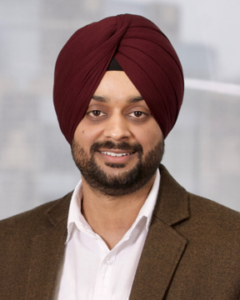
Prof. Harpreet S. Dhillon, Virginia Tech, USA
Harpreet S. Dhillon received the B.Tech. degree in electronics and communication engineering from IIT Guwahati in 2008, the M.S. degree in electrical engineering from Virginia Tech in 2010, and the Ph.D. degree in electrical engineering from the University of Texas at Austin in 2013. After serving as a Viterbi Postdoctoral Fellow at the University of Southern California for a year, he joined Virginia Tech in 2014, where he is currently an Associate Professor of electrical and computer engineering and the Elizabeth and James E. Turner Jr. ’56 Faculty Fellow. His research interests include communication theory, wireless networks, stochastic geometry, geolocation, and machine learning. He is a Clarivate Analytics Highly Cited Researcher and has received six best paper awards including the 2014 IEEE Leonard G. Abraham Prize, the 2015 IEEE ComSoc Young Author Best Paper Award, and the 2016 IEEE Heinrich Hertz Award. In 2020, he received Early Achievement Awards from the IEEE ComSoc Communication Theory Technical Committee (CTTC) and the IEEE ComSoc Radio Communications Committee (RCC). He was named the 2017 Outstanding New Assistant Professor, the 2018 Steven O. Lane Junior Faculty Fellow, the 2018 College of Engineering Faculty Fellow, and the recipient of the 2020 Dean’s Award for Excellence in Research by Virginia Tech. His other academic honors include the 2008 Agilent Engineering and Technology Award, the UT Austin MCD Fellowship, the 2013 UT Austin WNCG leadership award, and the inaugural IIT Guwahati Young Alumni Achiever Award 2020. He is currently serving as a Senior Editor for the IEEE Wireless Communications Letters and an Editor for the IEEE Transactions on Wireless Communications and the IEEE Transactions on Green Communications and Networking. He is also serving as the TPC Co-chair for IEEE WCNC 2022 and has served as the symposium or track TPC Co-chair for IEEE ICC 2020, IEEE ICC 2019, IEEE/CIC ICCC 2019, IEEE VTC 2018, and IEEE PIMRC 2017.
2020 WTC Recognition Award
Prof. Hamid Jafarkhani, University of California, Irvine, USA
Hamid Jafarkhani is a Chancellor’s Professor at the Department of Electrical Engineering and Computer Science, University of California, Irvine, where he is also the Director of Center for Pervasive Communications and Computing, the Co-Director of Networked Systems Program, and the Conexant-Broadcom Endowed Chair. He is the 2020-2022 elected Faculty Chair of the UCI School of Engineering. He was a Visiting Scholar at Harvard University in 2015 and a Visiting Professor at California Institute of Technology in 2018. Among his awards are the NSF Career Award, the UCI Distinguished Mid-Career Faculty Award for Research, the School of Engineering Excellence in Research Senior Career Award, the IEEE Marconi Prize Paper Award in Wireless Communications, the IEEE Communications Society Award for Advances in Communication, and the IEEE Eric E. Sumner Award. Dr. Jafarkhani is listed as an ISI highly cited researcher. According to the Thomson Scientific, he is one of the top 10 most-cited researchers in the field of “computer science” during 1997-2007. He is the 2017 Innovation Hall of Fame Inductee at the University of Maryland’s School of Engineering. He is a Fellow of AAAS, an IEEE Fellow, and the author of the book “Space-Time Coding: Theory and Practice.”
Prof. Rui Zhang, National University of Singapore, Singapore
Rui Zhang (S’00-M’07-SM’15-F’17) received the B.Eng. (first-class Hons.) and M.Eng. degrees from National University of Singapore, Singapore, and the Ph.D. degree from Stanford University, Stanford, CA, USA, all in electrical engineering. He is now a Professor in the Department of Electrical and Computer Engineering, National University of Singapore. He has published about 230 journal papers and 190 conference papers. He has been listed as a Highly Cited Researcher by Thomson Reuters/Clarivate Analytics since 2015. His current research interests include UAV/satellite communications, wireless power transfer, reconfigurable MIMO, and optimization methods. He was the recipient of the 6th IEEE Communications Society Asia-Pacific Region Best Young ResearcherAward in 2011, and the Young Researcher Award of National University of Singapore in 2015. He received 9 IEEE best journal paper awards, including the IEEE Marconi Prize Paper Award in Wireless Communications in 2015 and 2020, the IEEE Communications Society Heinrich Hertz Prize Paper Award in 2017 and 2020, the IEEE Signal Processing Society Best Paper Award in 2016 and Donald G. Fink Overview Paper Award in 2017, etc. He served for over 30 international conferences as the TPC co-chair or an organizing committee member. He was an elected member of the IEEE Signal Processing Society SPCOM and SAM Technical Committees, and has served as the Co-/Vice-Chair of the IEEE Communications Society Asia-Pacific Board in various committees. He served as an Editor/Guest Editor for 5 IEEE journals, and now serves as an Editor for the IEEE Transactions on Communications. He serves as a member of the Steering Committee of the IEEE Wireless Communications Letters. He is a Distinguished Lecturer of IEEE Signal Processing Society and IEEE Communications Society.
2020 WTC Outstanding Young Researcher Award
Prof. Sheng Zhou, Tsinghua University, China
Sheng Zhou is an associate professor in Electronic Engineering Department at Tsinghua University, Beijing, China. He received his B.S. and Ph.D. degrees in Electronic Engineering from Tsinghua University, in 2005 and 2011, respectively. From January to June 2010, he was a visiting student at Wireless System Lab, Electrical Engineering Department, Stanford University. From November 2013 to January 2014, he was a visiting researcher in Central Research Lab of Hitachi Ltd., Japan. His research interests include cross-layer design for multiple antenna systems, cooperative transmission in cellular systems, vehicular networks, edge computing, and green wireless communications. He is serving as an associate editor for Journal of Communications and Information Networks, and a guest editor for IEEE Internet of Things Journal. He served as an associate editor for IEEE Wireless Communications Letters. He served as the publicity chair of IEEE ICCC’12, IEEE Online GreenComm’14 and IEEE ICC’16, the symposium/track co-chair of IEEE/CIC ICCC’15&’18, APCC’17, IEEE PIMRC’17, and IEEE Globecom’18, and etc. He is a co-recipient of the Best Paper Award from APCC in 2009 and 2013, IEEE WCSP 2013 and 2018, ITC in 2013, and IEEE ICCC in 2020. He received the 2017 IEEE ComSoc Asia-Pacific Outstanding Young Researcher Award.
2019 WTC Recognition Award
Prof. Xuemin (Sherman) Shen, University of Waterloo, Canada
Xuemin (Sherman) Shen (M’97–SM’02–F’09) received the Ph.D. degree in electrical engineering from Rutgers University, New Brunswick, NJ, USA, in 1990. He is currently a University Professor with the Department of Electrical and Computer Engineering, University of Waterloo, Waterloo, ON, Canada. His research focuses on resource management, wireless network security, social networks, 5G and beyond, and vehicular ad hoc and sensor networks. He is a registered Professional Engineer of Ontario, Canada, an Engineering Institute of Canada Fellow, a Canadian Academy of Engineering Fellow, a Royal Society of Canada Fellow, and a Distinguished Lecturer of the IEEE Vehicular Technology Society and Communications Society.
Dr. Shen received the R.A. Fessenden Award in 2019 from IEEE, Canada, the James Evans Avant Garde Award in 2018 from the IEEE Vehicular Technology Society, the Joseph LoCicero Award in 2015 and the Education Award in 2017 from the IEEE Communications Society. He has also received the Excellent Graduate Supervision Award in 2006 and the Outstanding Performance Award 5 times from the University of Waterloo and the Premier’s Research Excellence Award (PREA) in 2003 from the Province of Ontario, Canada. He served as the Technical Program Committee Chair/Co-Chair for the IEEE Globecom’16, the IEEE Infocom’14, the IEEE VTC’10 Fall, the IEEE Globecom’07, the Symposia Chair for the IEEE ICC’10, the Tutorial Chair for the IEEE VTC’11 Spring, and the Chair for the IEEE Communications Society Technical Committee on Wireless Communications. He is the Editor-in-Chief of the IEEE INTERNET OF THINGS JOURNAL and the Vice President on Publications of the IEEE Communications Society.
Prof. Jeffrey Andrews, University of Texas at Austin, USA
Jeffrey Andrews (S’98, M’02, SM’06, F’13) received the B.S. in Engineering with High Distinction from Harvey Mudd College, and the M.S. and Ph.D. in Electrical Engineering from Stanford University. He is the Cullen Trust Endowed Professor (#1) of ECE at the University of Texas at Austin. He developed Code Division Multiple Access systems at Qualcomm from 1995-97, and has served as a consultant to Samsung, Nokia, Qualcomm, Apple, Verizon, AT&T, Intel, Microsoft, Sprint, and NASA. He is a member of the Technical Advisory Board of Artemis Networks and GenXComm, and is co-author of the books Fundamentals of WiMAX (Prentice-Hall, 2007) and Fundamentals of LTE (Prentice-Hall, 2010). He was the Editor-in-Chief of the IEEE Transactions on Wireless Communications from 2014-2016 and is Chair of the IEEE Communications Society Emerging Technologies Committee.
Dr. Andrews is an ISI Highly Cited Researcher and has been co-recipient of 15 paper awards including the 2016 IEEE Communications Society & Information Theory Society Joint Paper Award, the 2014 IEEE Stephen O. Rice Prize, the 2014 and 2018 IEEE Leonard G. Abraham Prize, the 2011 and 2016 IEEE Heinrich Hertz Prize, and the 2010 IEEE ComSoc Best Tutorial Paper Award. He received the 2015 Terman Award, the NSF CAREER Award, is an IEEE Fellow, and received the 2019 IEEE Kiyo Tomiyasu technical field award.
2019 WTC Outstanding Young Researcher Award
Prof. Jie Xu, Guangdong University of Technology, China
Jie Xu (S’12–M’13) is currently a Professor with the School of Information Engineering, Guangdong University of Technology, China. He received the B.E. and Ph.D. degrees from the University of Science and Technology of China, in 2007 and 2012, respectively. From 2012 to 2016, he was a Post-Doctoral Research Fellow with the National University of Singapore and the Singapore University of Technology and Design. He has published over 90 IEEE journal and conference papers, which have attracted more than 3300 Google Scholar citations.
Dr. Xu was a recipient of the 2017 IEEE Signal Processing Society Young Author Best Paper Award and the IEEE/CIC ICCC 2019 Best Paper Award. He serves as the Symposium Co-Chair of the IEEE Globecom 2019 Wireless Communications Symposium. He is serving or served as an Editor for the IEEE Wireless Communications Letters, and a Guest Editor for the IEEE Wireless Communications and IEEE Journal on Selected Areas in Communications.
2018
Prof. Halim Yanikomeroglu, Carleton University, Canada
Dr. Yanikomeroglu is a full professor in the Department of Systems and Computer Engineering at Carleton University, Canada. He has made substantial contributions to wireless research, innovation, and education. He has been a very active and exemplary member of IEEE, ComSoc, and Wireless Communications Technical Committee; he has served in these platforms in almost every capacity.
Dr. Yanikomeroglu has had extensive collaboration with industry and led large-scale research projects. His collaborative research resulted in 25 granted patents (plus about a dozen applied). In the previous decade, he participated in the EUWINNER Project, which was at the time world’s largest collaborative research project in wireless with 40 partners from academia and industry. The WINNER Project (including Dr. Yanikomeroglu’s work on wireless relaying and intercell interference coordination technologies) had substantial impact to the 4G LTE standardization. More recently, he led a 5-year project which was one of the largest pre-standards 5G research projects, sponsored by the industry and the Ontario government. In 2019, Dr. Yanikomeroglu plans to initiate another large-scale project with the theme “integrated aerial-terrestrial 6G network architecture for 2030s”. Dr. Yanikomeroglu has coauthored 360 peer-reviewed research papers including 120 in the IEEE journals; these publications have received 11,000 citations including very many in patent applications.
Prof. Robert Heath, University of Texas at Austin, USA
Dr. Heath is a Cullen Trust Endowed Professor in the Department of Electrical and Computer Engineering at The University of Texas at Austin. His research expertise is at the intersection of wireless communication, signal processing, applied math, and communication theory. He has an active research program in all aspects of MIMO (multiple-input multiple-output) communication including multiuser MIMO, massive MIMO, MIMO cellular networks, and MIMO ad hoc networks. At present, he is focusing on millimeter wave communication, with applications to cellular, ad hoc, wearable, vehicular, and local area networks. He teaches courses at both the undergraduate and the graduate level on topics such as wireless communication, digital signal processing, statistical signal processing, and multiple antenna communication methods. Of particular interest, he has developed a complete Wireless Communications Laboratory course with lecture notes, textbook, and experiments, now available for the USRP platform. Lectures and lecture notes are available as well. He enjoys participating and interacting with industry and government through sponsored research, standards participation, and consulting.
2017
Prof. Robert Schober, University of British Columbia (UBC), Canada
Robert Schober received the Dr.-Ing. degree from Friedrich-Alexander-University of Erlangen-Nuremberg (FAU), Germany, in 2001. From 2001 to 2002, he was a postdoctoral fellow at the University of Toronto, Canada. From 2002 to 2016, he was a Professor at the University of British Columbia (UBC), Canada. From 2002 to 2012, he was a Canada Research Chair in Wireless Communications, and from 2009-2011, he served as the Associate Department Head for Research and International Outreach at the same institution. Since January 2012, he is an Alexander von Humboldt Professor and Chair for Digital Communication at FAU.
Robert’s research interests fall into the broad areas of Communication Theory, Wireless Communications, and Statistical Signal Processing. He has received several awards for his research including a 2002 Heinz Maier-Leibnitz Award of the German Science Foundation (DFG), the 2004 Innovation Award of the Vodafone Foundation for Research in Mobile Communications, a 2006 UBC Killam Research Prize, a 2007 Wilhelm Friedrich Bessel Research Award of the Alexander von Humboldt Foundation, the 2008 Charles McDowell Award for Excellence in Research from UBC, and a 2011 Steacie Fellowship from the National Science and Engineering Council of Canada (NSERC). He is a Fellow of the IEEE, the Canadian Academy of Engineering (CAE), and the Engineering Institute of Canada (EIC).
From 2012 to 2015, he was the Editor-in-Chief of the IEEE Transactions on Communications. Currently, he serves as Member-at-Large on the Board of Governors of the IEEE Communication Society, as Chair of the Steering Committee of the new journal IEEE Transactions on Molecular, Biological, and Multi-Scale Communications, and on the Editorial Board of the Proceedings of the IEEE. He is also a Distinguished Lecturer of the IEEE Communication Society.
Prof. Mohsen Guizani, University of Idaho, USA
Mohsen Guizani (S’85–M’89–SM’99–F’09) received the B.S. (with distinction) and M.S. degrees in electrical engineering, the M.S. and Ph.D. degrees in computer engineering from Syracuse University, Syracuse, NY, USA, in 1984, 1986, 1987, and 1990, respectively. He is currently a Professor and the ECE Department Chair at the University of Idaho, USA. Previously, he served as the Associate Vice President of Graduate Studies, Qatar University, Chair of the Computer Science Department, Western Michigan University, and Chair of the Computer Science Department, University of West Florida. He also served in academic positions at the University of Missouri-Kansas City, University of Colorado-Boulder, Syracuse University, and Kuwait University. His research interests include wireless communications and mobile computing, computer networks, mobile cloud computing, security, and smart grid. He currently serves on the editorial boards of several international technical journals and the Founder and the Editor-in-Chief of Wireless Communications and Mobile Computing journal (Wiley). He is the author of nine books and more than 500 publications in refereed journals and conferences. He guest edited a number of special issues in IEEE journals and magazines. He also served as a member, Chair, and General Chair of a number of international conferences. He received the teaching award multiple times from different institutions as well as the best Research Award from three institutions. He was the Chair of the IEEE Communications Society Wireless Technical Committee and the Chair of the TAOS Technical Committee. He served as the IEEE Computer Society Distinguished Speaker from 2003 to 2005. He is a Fellow of IEEE and a Senior Member of ACM.
2016
Prof. Mohamed-Slim Alouini, King Abdullah University of Science and Technology (KAUST), Saudi Arabia
Dr. Alouini was born in Tunis, Tunisia. He received the Diplome d’Ingenieur from the École Nationale Supérieure des Télécommunications (TELECOM Paris Tech) and the Diplome d’Etudes Approfondies (D.E.A.) in Electronics with Highest Honors from the Université Pierre & Marie Curie in Paris, both in 1993. He received the M.S.E.E. degree from the Georgia Institute of Technology (Georgia Tech) in 1995, and a PhD in Electrical Engineering from California Institute of Technology (Caltech) in 1998. He also received the Habilitation degree from the Université Pierre & Marie Curie in 2003.
Dr. Alouini served as a faculty member in the University of Minnesota, Minneapolis, MN, USA, then in the Texas A&M University at Qatar, Education City, Doha, Qatar before joining King Abdullah University of Science and Technology (KAUST), Thuwal, Makkah Province, Saudi Arabia as a Professor of Electrical Engineering in 2009. His current research interests include design and performance analysis of diversity combining techniques, MIMO techniques, multi-hop/cooperative communications systems, optical wireless communication systems, cognitive radio systems, and multi-resolution, hierarchical and adaptive modulation schemes.
Dr. Alouini has published several papers on the above subjects, and he is co-author of the textbook Digital Communication over Fading Channels published by Wiley Interscience. He is a Fellow of the Institute of Electrical and Electronics Engineers (IEEE), an IEEE Distinguished Lecturer for the IEEE Communication Society, and a member of the Thomson ISI Web of Knowledge list of Highly Cited Researchers as well as the Shanghai Ranking/Elsevier list of Most Cited Researchers. He is co-recipient of best paper awards in ten IEEE conferences (including ICC, GLOBECOM, VTC, PIMRC, and DySPAN).
Prof. Junshan Zhang, Arizona State University, USA
Junshan Zhang received his Ph.D. degree from the School of ECE at Purdue University in 2000. He joined the School of ECEE at Arizona State University in August 2000, where he has been Fulton Chair Professor since 2015. His research interests fall in the general field of information networks and its intersections with social networks and power networks. His current research focuses on fundamental problems in information networks and energy networks, including modeling and optimization for cyber-physical systems, optimization/control of mobile social networks and cognitive radio networks, and privacy/security in information networks.
Prof. Zhang is a Fellow of the IEEE, and a recipient of the ONR Young Investigator Award in 2005 and the NSF CAREER award in 2003. He received the IEEE Wireless Communication Technical Committee Recognition Award in 2016. His papers have won a few awards, including the Kenneth C. Sevcik Outstanding Student Paper Award of ACM SIGMETRICS/IFIP Performance 2016, the Best Paper Runner-up Award of IEEE INFOCOM 2009 and IEEE INFOCOM 2014, and the Best Paper Award at IEEE ICC 2008. He was TPC co-chair for a number of major conferences in communication networks, including IEEE INFOCOM 2012 and ACM MOBIHOC 2015. He was the general chair for WiOpt 2016 and IEEE Communication Theory Workshop 2007. He was an Associate Editor for IEEE Transactions on Wireless Communications, an editor for the Computer Network journal and an editor IEEE Wireless Communication Magazine. He was a Distinguished Lecturer of the IEEE Communications Society. He is currently serving as an editor-at-large for IEEE/ACM Transactions on Networking and an editor for IEEE Network Magazine.
2015
Prof. Chengshan Xiao, Missouri University of Science and Technology, USA
Chengshan Xiao (M’99-SM’02-F’10) earned a Bachelor of Science degree in electronic engineering from the University of Electronic Science and Technology of China in 1987, a Master of Science degree in electronic engineering from Tsinghua University in 1989, and a Ph.D. in electrical engineering from the University of Sydney in 1997.
Dr. Xiao is a Professor with the Department of Electrical and Computer Engineering at Missouri University of Science and Technology, Rolla, MO (formerly the University of Missouri – Rolla). He is currently serving as a Program Director at USA National Science Foundation through intergovernmental personnel act assignment. Previously, he was a senior member of scientific staff with Nortel Networks, Ottawa, Canada, a faculty member at Tsinghua University, Beijing, China, the University of Alberta, Edmonton, Canada, and the University of Missouri – Columbia, MO. He also held visiting professor positions in Germany and Hong Kong. His research interests include wireless communications, signal processing, and underwater acoustic communications. He is the holder of three U.S. patents. His invented algorithms have been implemented into Nortel’s base station radio products after successful technical field trials and network integration.
Dr. Xiao is the Director of Conference Publications of IEEE Communications Society (ComSoc), and a member of IEEE ComSoc Fellow Evaluation Committee. Previously, he served as an elected member of IEEE ComSoc Board of Governors, a Distinguished Lecturer of both IEEE ComSoc and IEEE Vehicular Technology Society. He also served as an Editor, an Area Editor and the Editor-in-Chief of the IEEE Transactions on Wireless Communications, an Associate Editor of the IEEE Transactions on Vehicular Technology, and the IEEE Transactions on Circuits and Systems-I. He was the Technical Program Chair of the 2010 IEEE International Conference on Communications, Cape Town, South Africa. He served as the founding Chair of the IEEE Technical Committee on Wireless Communications. He is a recipient of the 2014 Humboldt Research Award from the Alexander von Humboldt Foundation, and the recipient of the 2014 Joseph LoCicero Award from IEEE Communications Society.
Prof. Romano P. Fantacci, University of Florence, Italy
Dr. Romano P. Fantacci is a professor of Computer Networks at the University of Florence, Florence, Italy, where he heads the Wireless Networks Research Lab.. He is the founding director of the Information Communication Technology Inc. (TiCOM), with Finmeccanica spa and of the Wireless Communications Research Centre (LiRS) with Telecom Italia. He received the M.S. degree in Electrical Engineering from the University of Florence, Italy and the Ph.D. degree in Computer Networks from the University of Padua, Italy. His current research interests encompass several fields of wireless engineering and computer communication networking including, in particular, performance evaluation and optimization of wireless networks, emerging generations of wireless standards and cognitive wireless communications and networks.
Dr. Fantacci was elected Fellow of the IEEE in 2005 for contributions to wireless communication networks. He received several awards for his research, including the IEE Benefactor Premium, the IEEE Distinguished Contributions to Satellite Communications Award, the IEEE sister society AEIT Young Research Award and the IARIA Best Paper Award. He served as Area Editor for IEEE Trans. Wireless Commun., Associate Editor for IEEE Trans. on Commun., IEEE Trans. Wireless Commun. and Associate Editor for Telecommunications Systems. He guest edited special issues for IEEE Journals and Magazines and served as symposium chair of several IEEE conferences, including VTC, WCNC, PIRMC, ICC and Globecom. Dr. Fantacci currently serves on the Board of Governors of the IEEE sister society AEIT and on the Advisory Board of Security and Communication Networks J., as well as Associate Editor for International J. Commun. Systems, Regional Editor for IET Communications and Associate Editor for IEEE Networks.
2014
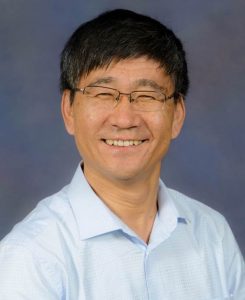
Prof. Yuguang “Michael” Fang, University of Florida, USA
Dr. Yuguang “Michael” Fang (F’08) received his BS/MS from Qufu Normal University, China, two Ph.D degrees from Case Western Reserve University and Boston University, respectively. He joined New Jersey Institute of Technology as an assistant professor in 1998. He then moved to University of Florida in 2000 as an assistant professor, got an early promotion to an associate professor with tenure in August 2003 and to a full professor in August 2005. He held a University of Florida Research Foundation (UFRF) Professorship from 2006 to 2009, a Changjiang Scholar Chair Professorship with Xidian University, China, from 2008 to 2011, and a Guest Chair Professorship with Tsinghua University from 2009 to 2012. He received NSF CAREER Award, ONR Young Investigator Award, the Best Paper Award at IEEE Globecom (2011, 2002) and ICNP (2006), a 2010-2011 University of Florida Doctoral Dissertation Advisor/Mentoring Award, and 2009 UF College of Engineering Faculty Mentoring Award.
Dr. Fang has provided tremendous services to his community. He has been serving as the Editor-in-Chief of IEEE Transactions on Vehicular Technology since April 2013. He served as the Editor-in-Chief for IEEE Wireless Communications (2009-2012) and serves/served on several editorial boards of technical journals including IEEE Transactions on Mobile Computing (2003-2008, 2011-present), IEEE Network (2012-present), IEEE Transactions on Communications (2000-2011), IEEE Transactions on Wireless Communications (2002-2009), IEEE Journal on Selected Areas in Communications (1999-2001), IEEE Wireless Communications Magazine (2003-2009) and ACM Wireless Networks (2001-present). He served on the Steering Committee for IEEE Transactions on Mobile Computing (2008-2010). He has also been actively participating in professional conference organizations such as serving as the Technical Program Co-Chair for IEEE INOFOCOM’2014, the Steering Committee Co-Chair for QShine (2004-2008), the Technical Program Vice-Chair for IEEE INFOCOM’2005, the Technical Program Area Chair for IEEE INFOCOM (2009-2015), Technical Program Symposium Co-Chair for IEEE Globecom’2004, and a member of Technical Program Committee for IEEE INFOCOM (1998, 2000, 2003-2008). He is a fellow of the IEEE.
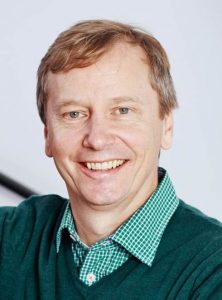
Prof. Gerhard P. Fettweis, Technische Universitat Dresden, Germany
Gerhard Fettweis earned his Ph.D. under H. Meyr’s supervision from RWTH Aachen in 1990. After one year at IBM Research in San Jose, CA, he moved to TCSI Inc., Berkeley, CA. Since 1994 he is Vodafone Chair Professor at TU Dresden, Germany, with 20 companies from Asia/Europe/US sponsoring his research on wireless transmission and chip design. He coordinates 2 DFG centers at TU Dresden, namely cfaed and HAEC, as well as the “5G Lab Germany” and the TwinLab between Masdar Institute (Abu Dhabi) and TU Dresden.
Gerhard is IEEE Fellow, member of the German National Academy of Science and Engineering (acatech), and his most recent award is the Stuart Meyer Memorial Award from IEEE VTS. In Dresden he has spun-out eleven start-ups, and setup funded projects in volume of close to EUR 1/2 billion. He has helped organizing IEEE conferences, most notably as TPC Chair of ICC 2009 and of TTM 2012, and as General Chair of VTC Spring 2013 and DATE 2014.
2013
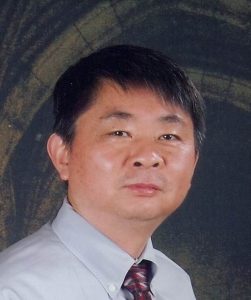
Prof. Geoffrey LI, Georgia Institute of Technology, USA
Geoffrey YE LI is a Professor at the School of Electrical and Computer Engineering, Georgia Institute of Technology. Before joining Georgia Tech, he was with AT&T Labs – Research at Red Bank, New Jersey, as a Senior and then a Principal Technical Staff Member from 1996 to 2000. He is also holding the Cheung Kong Scholar title at the University of Electronic Science and Technology of China since March 2006.
His general research interests include statistical signal processing and tele-communications. In these areas, he has published over 300 referred journal and conference papers in addition to 25 granted patents. His publications have been cited over 15,000 times and he is listed as a highly cited researcher by Thomson Reuters. He once served or is currently serving as an editor, a member of editorial board, and a guest editor for over 10 technical journals. He organized and chaired many international conferences, including IEEE ICC’03, IEEE SPAWC’11, and IEEE GlobalSIP’14. He has been awarded an IEEE Fellow for his contributions to signal processing for wireless communications since 2006, and won 2010 Stephen O. Rice Prize Paper Award from IEEE Communications Society in the field of communications theory and 2013 James Evans Avant Garde Award from IEEE Vehicular Technology Society for advancing the state-of-art in OFDM-aided wireless communications.
2012
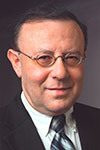
Zygmunt J. Haas, Cornell University, USA
Dr. Zygmunt J. Haas received his Ph.D. in 1988 from Stanford University, Electrical Engineering department. In 1988, he joined the AT&T Bell Laboratories in the Network Research Area. There he pursued research in wireless communications, mobility management, fast protocols, optical networks, and optical switching. In August 1995, he joined the faculty of the School of Electrical and Computer Engineering at Cornell University, where he is now a Professor. He heads the Wireless Network Laboratory (wnl.ece.cornell.edu), a research group with extensive contributions in the area of Ad Hoc Networks and Sensor Networks. Dr. Haas is an IEEE Fellow and an author of over 200 technical conference and journal papers. He holds eighteen patents in the areas of wireless networks and wireless communications, optical switching and optical networks, and high-speed networking protocols. He won several “Best Paper” awards and a number of “Teaching Awards”.
Dr. Haas chaired and co-chaired several key conferences in the communications and networking areas, organized many workshops, and delivered numerous tutorials at major IEEE and ACM conferences. He also chaired a number of IEEE Technical Committees, including chairing the IEEE Technical Committee on Personal Communications (TCPC). He has served as editor of many journals and magazines, including the IEEE Transactions on Networking, the IEEE Transactions on Wireless Communications, the IEEE Communications Magazine, and the Springer Wireless Networks journal (WINET). He has been a guest editor of a number of IEEE Communications Magazine special issues and several of IEEE JSAC issues; e.g., “Gigabit Networks,” “Mobile Computing Networks,” and “Ad-Hoc Networks.”
His research interests comprise: mobile and wireless communication and networks, modeling and performance evaluation of large and complex systems, and biologically-inspired networks. His e-mail is: zhaas@cornell.edu.
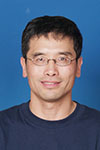
Zhi Ding, University of California, Davis Campus, USA
Dr. Zhi Ding (S’88-M’90-SM’95-F’03) is the Child Family Endowed Professor of Engineering and Entrepreneurship at the University of California, Davis. He also holds a joint appointment as a thousand-talent professorship at Southeast University in Nanjing, China. He received his Ph.D. degree in Electrical Engineering from Cornell University in 1990. From 1990 to 2000, he was a faculty member of Auburn University and later, University of Iowa. Prof. Ding has held visiting positions in Australian National University, Hong Kong University of Science and Technology, NASA Lewis Research Center and USAF Wright Laboratory. Prof. Ding has active collaboration with researchers from several countries including Australia, China, Japan, Canada, Taiwan, Korea, Singapore, and Hong Kong.
Dr. Ding is a Fellow of IEEE and has been an active member of IEEE, serving on technical programs of several workshops and conferences. He was associate editor for IEEE Transactions on Signal Processing from 1994-1997, 2001-2004, and associate editor of IEEE Signal Processing Letters 2002-2005. He was a member of technical committee on Statistical Signal and Array Processing and member of technical committee on Signal Processing for Communications (1994-2003). Dr. Ding was the Technical Program Chair of the 2006 IEEE Globecom. He is also an IEEE Distinguished Lecturer (Circuits and Systems Society, 2004-06, Communications Society, 2008-09). He served on as IEEE Transactions on Wireless Communications Steering Committee Member (2007-2009) and its Chair (2009-2010). Dr. Ding is a coauthor of the text: Modern Digital and Analog Communication Systems, 4th edition, Oxford University Press, 2009.
2011
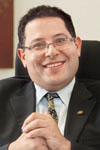
Prof. Khaled B. Letaief, The Hong Kong University of Science and Technology, Hong Kong
Dr. Letaief received his Ph.D. Degree from Purdue University, USA. He is currently Chair Professor and Dean of Engineering at HKUST. He is also currently the Director of the Hong Kong Telecom Institute of Information Technology.
He is an acknowledged authority in wireless communications with over 450 papers along with 13 patents. He is the founding Editor-in-Chief of the highly-rated IEEE TRANSACTIONS ON WIRELESS COMMUNICATIONS and served as Vice-President of the IEEE Communications Society as well as Editor on various journals. He has been involved in organizing a number of major international conferences and events (WCNC’07; ICC’08; ICC’10; TTM’11; and ICCC’12).
He is the recipient of many distinguished awards including the Mangoon Teaching Award from Purdue University; the Teaching Excellence Appreciation Award by the School of Engineering at HKUST (4 times); and the Michael G. Gale Medal for Distinguished Teaching (Highest university-wide teaching award). He is also the recipient of many other awards including the 2007 IEEE Communications Society Publications Exemplary Award, 2009 IEEE Marconi Prize Award in Wireless Communications, 2010 Outstanding Electrical and Computer Engineer Award by Purdue University, 2011 IEEE Communications Society Harold Sobol Award, and 10 IEEE Best Paper Awards.
Dr. Letaief is a Fellow of IEEE and is currently serving as Member of the IEEE Product Services and Publications Board, and the Treasurer of the IEEE Communications Society. He is also recognized by Thomson Reuters as an ISI Highly Cited Researcher.
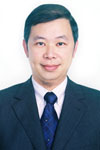
Kwang-Cheng Chen, National Taiwan University, Taipei, Taiwan, ROC
Dr. Kwang-Cheng Chen received B.S. from the National Taiwan University in 1983, M.S. and Ph.D from the University of Maryland, College Park, United States, in 1987 and 1989, all in electrical engineering. From 1987 to 1998, Dr. Chen worked with SSE, COMSAT, IBM Thomas J. Watson Research Center, and National Tsing Hua University, in mobile communications. Since 1998, Dr. Chen has been with the National Taiwan University, Taipei, Taiwan, ROC, where he was appointed as the Irving T. Ho Chair Professor from 2007 to 2008. Since 2009, he is the Distinguished Professor and Director of the Graduate Institute of Communication Engineering, and Director of Communication Research Center. In addition to service for IEEE journals, conferences, and IEEE ComSoc and VTS, Dr. Chen engineered Taiwan’s telecommunication deregulation and planned Taiwan’s telecommunication regulator NCC in late 1990’s. He has authored and co-authored near 200 IEEE papers including those to receive 2001 ISI Classic Citation Award, IEEE ICC 2010 Best Paper Award, 2010 IEEE GLOBECOM GOLD Best Paper Award, 20 granted US patents, and 3 books Cognitive Radio Networks (with R. Prasad) by Wiley 2009, Mobile WiMAX (ed. with R. DeMarca) by Wiley 2008, and Principles of Communications by River 2009. Dr. Chen founded a wireless communication IC company to enable wireless broadband solution for the world’s first smart phone, which was acquired by Mediatek in 2004. He is an IEEE Fellow and his technological innovations have been adopted in the IEEE 802.11, IEEE 802.15, Bluetooth 2.0 & 3.0, and 3GPP LTE-A. Dr. Chen’s current research interests include wireless communications and network science.
2010

Prof. Leonard J. Cimini, Jr., University of Delaware, USA
Dr. Len Cimini received a Ph.D. from the University of Pennsylvania in 1982, and, then worked at Bell Labs and AT&T Labs for twenty years. In 2002, he joined the ECE Department at the University of Delaware. He has published more than 140 journal and conference papers and has been awarded 21 US patents. Dr. Cimini has been very active within the IEEE, and he was the founding Editor-in-Chief of the IEEE J-SAC: Wireless Communications Series. He has served two terms as a Member at-Large on the Board of Governors of the IEEE Communications Society, and is currently Vice President – Publications. He was elected a Fellow of the IEEE in 2000 for contributions to the theory and practice of high-speed wireless communications, and, in 2007, was given the James R. Evans Avant Garde Award from the IEEE Vehicular Technology Society for his pioneering work on OFDM for wireless communications. In 2010, he was recognized as an Innovator by the New Jersey Inventor’s Hall of Fame and was given the Donald W. McLellan Meritorious Service Award from the IEEE Communications Society.

Prof. H. Vincent Poor, Princeton University, USA
Dr. H. Vincent Poor is the Michael Henry Strater University Professor of Electrical Engineering at Princeton University, where he is also Dean of the School of Engineering and Applied Science. His interests lie in the areas of statistical signal processing, stochastic analysis and information theory, with applications in wireless networks and related fields. Among his publications in these areas are the recent books Quickest Detection (Cambridge, 2009) and Information Theoretic Security (Now Publishers, 2009). Dr. Poor is a member of the U. S. National Academy of Engineering, a Fellow of the American Academy of Arts and Sciences, and an International Fellow of the Royal Academy of Engineering of the UK. He is also a Fellow of the IEEE and other scientific and technical organizations. He received a received a Guggenheim Fellowship in 2002 and the IEEE Education Medal in 2005. Recent recognition of his work includes the 2007 Marconi Prize Paper Award in Wireless Communications, and the 2009 Edwin Howard Armstrong Achievement Award, both from the IEEE Communications Society.
2009

Prof. Jerry D. Gibson, University of California, USA
Dr. Jerry D. Gibson (F’92) is Professor and Department Chair of Electrical and Computer Engineering at the University of California, Santa Barbara. He is co-author of the books: Digital Compression for Multimedia (Morgan-Kaufmann, 1998) and Introduction to Nonparametric Detection with Applications (Academic Press, 1975 and IEEE Press, 1995) and author of the textbook Principles of Digital and Analog Communications (Prentice-Hall, second ed., 1993). He is Editor-in-Chief of The Mobile Communications Handbook (CRC Press, 2nd ed., 1999), Editor-in-Chief of The Communications Handbook (CRC Press, 2nd ed., 2002), and Editor of the book Multimedia Communications: Directions and Innovations (Academic Press, 2000). His research interests include data, speech, image, and video compression, multimedia over networks, wireless communications, information theory, and digital signal processing.
He was Associate Editor for Speech Processing for the IEEE TRANSACTIONS ON COMMUNICATIONS from 1981 to 1985 and Associate Editor for Communications for the IEEE TRANSACTIONS ON INFORMATION THEORY from 1988 to 1991. He was President of the IEEE Information Theory Society in 1996, and a member of the Speech Technical Committee of the IEEE Signal Processing Society from 1992 to 1994. He served as Technical Program Chair of the 1999 IEEE Wireless Communications and Networking Conference, Technical Program Chair of the 1997 Asilomar Conference on Signals, Systems, and Computers, and General Co-Chair of the 1993 IEEE International Symposium on Information Theory. He was an elected Member-at-Large on the Communications Society Board of Governors for 2005 to 2007. Currently, he serves on the Steering Committee for the Wireless Communications and Networking Conference and on the Editorial Board of the Hindawi Open Access journal Advances in Multimedia. He was an IEEE Communications Society Distinguished Lecturer for 2007-2008 and he is a member of the IEEE Awards Committee, 2008-2010.
Dr. Gibson received The Fredrick Emmons Terman Award from the American Society for Engineering Education in 1990, and in 1992 was elected Fellow of the IEEE “for contributions to the theory and practice of adaptive prediction and speech waveform coding.” He was co-recipient of the 1993 IEEE Signal Processing Society Senior Paper Award for the Speech Processing area.

Prof. Andrea Goldsmith, Stanford University, USA
Dr. Andrea Goldsmith is a professor of Electrical Engineering at Stanford University, and was previously an assistant professor of Electrical Engineering at Caltech. She founded Quantenna Communications Inc., and has previously held industry positions at Maxim Technologies, Memorylink Corporation, and AT&T Bell Laboratories. Her research includes work on wireless information and communication theory, MIMO systems and multihop networks, cognitive radios, sensor networks, cross-layer wireless system design, wireless communications for distributed control, and communications for biomedical applications. She is author of the book “Wireless Communications” and co-author of the book “MIMO Wireless Communications,” both published by Cambridge University Press. She received the B.S., M.S. and Ph.D. degrees in Electrical Engineering from U.C. Berkeley.
Dr. Goldsmith is a Fellow of the IEEE and of Stanford. She has received several awards for her research, including the National Academy of Engineering Gilbreth Lectureship, the Alfred P. Sloan Fellowship, the Stanford Terman Fellowship, the National Science Foundation CAREER Development Award, and the Office of Naval Research Young Investigator Award. In addition, she was a co-recipient of the 2005 IEEE Communications Society and Information Theory Society joint paper award. Dr. Goldsmith currently serves as associate editor for the IEEE Transactions on Information Theory and as editor for the Journal on Foundations and Trends in Communications and Information Theory and in Networks. She previously served as an editor for the IEEE Transactions on Communications and for the IEEE Wireless Communications Magazine, as well as guest editor for several IEEE journal and magazine special issues. Dr. Goldsmith participates actively in committees and conference organization for the IEEE Information Theory and Communications Societies and has served on the Board of Governors for both societies. She is a Distinguished Lecturer for both societies, the President of the IEEE Information Theory Society, and was the technical program co-chair for the 2007 IEEE International Symposium on Information Theory. She also founded the student committee of the IEEE Information Theory society, is an inaugural recipient of Stanford’s postdoc mentoring award, and was elected to serve as Stanford’s faculty senate chair for the 2009/2010 academic year.
2008
Prof. David Falconer, Carleton University, Ottawa, Canada
Dr. David D. Falconer received the B.A. Sc. degree in Engineering Physics from the University of Toronto in 1962 and the S.M. and Ph.D. degrees in Electrical Engineering from M.I.T. in 1963 and 1967 respectively. After a year as a postdoctoral fellow at the Royal Institute of Technology, Stockholm, Sweden he was with Bell Laboratories, Holmdel, New Jersey from 1967 to 1980, as a member of the technical staff and later as group supervisor. During 1976-77 he was a visiting professor at Linköping University, Linköping, Sweden. Since 1980 he has been with Carleton University, Ottawa, Canada, where he is now Professor Emeritus and Distinguished Research Professor in the Department of Systems and Computer Engineering. His current research interests center around beyond-third-generation broadband wireless communications systems. He was awarded Communications Society Prize Paper Awards in Communications Circuits and Techniques in 1983 and 1986. He was a co-recipient of the IEEE Vehicular Technology Transactions best paper of the year award in 1992. From 1981 to 1987 he was Editor for Digital Communications of the IEEE Transactions on Communications. He was Director of Carleton’s Broadband Communications and Wireless Systems (BCWS) Centre from 2000 to 2004. He was the Chair of Working Group 4 (New Radio Interfaces, Relay-Based Systems and Smart Antennas) of the Wireless World Research Forum (WWRF) in 2004 and 2005. He received the Canadian award for Telecommunications Research in 2008. He is an IEEE Life Fellow.

Prof. Ted Rappaport, University of Texas at Austin, USA
Dr. Ted Rappaport is the William and Bettye Nowlin Chair in Engineering at the University of Texas at Austin and is the founding director of the Wireless Networking and Communications Group (WNCG) at the university’s Austin campus, a center he founded in 2002. Prior to joining UT Austin, he was on the electrical and computer engineering faculty of Virginia Tech from 1988 to 2002, where he founded the Mobile and Portable Radio Research Group (MPRG), one of the world’s first university research and teaching centers dedicated to the wireless communications field. Prof. Rappaport has been a pioneer in the fields of radio wave propagation and wireless communication system design. His research has influenced many international wireless standard bodies over the past two decades, and his work has led to the broad acceptance of site-specific radio frequency (RF) propagation modeling and design for broadband wireless network deployment. Dr. Rappaport is one of the most highly cited authors in the wireless field, according to ISI Highly Cited, having published over 200 technical papers. As a faculty member, Rappaport has advised approximately 100 students who continue to accomplish great things in the communications and electromagnetics fields throughout industry, academia, and government. In 2006, Rappaport was elected to serve on the Board of Governors of the IEEE Communications Society (ComSoc), and was elected to the Board of Governors of the IEEE Vehicular Technology Society (VTS) in 2008 . He is a fellow of the IEEE and serves on the editorial boards of several academic and technical journals. He received the Marconi Young Scientist Award in 1990, an NSF Presidential Faculty Fellowship in 1992, the Sarnoff Citation from the Radio Club of America in 2000, the Fredrick E. Terman Outstanding Electrical Engineering Faculty Award from the ASEE in 2002, and the Stuart F. Meyer Award from the IEEE Vehicular Technology Society in 2005. Rappaport has over 100 U.S. or international patents issued or pending and has authored, co-authored and co-edited 18 books in the wireless field, including “Wireless Communications: Principles & Practice” (translated into 9 languages), “Principles of Communication Systems Simulation with Wireless Applications”, and “Smart Antennas for Wireless Communications: IS-95 and Third Generation CDMA Applications.” In 1999, his work on site-specific propagation received the IEEE Communications Society Stephen O. Rice Prize Paper Award. In 1989, he founded TSR Technologies, Inc., a cellular radio/PCS software radio manufacturer that he sold in 1993 to what is now CommScope, Inc (NYSE: CTV) . In 1995, he founded Wireless Valley Communications Inc., a pioneering creator of site-specific radio propagation software for network design and management that he sold to Motorola, Inc. (NYSE: MOT) in 2005. Rappaport has testified before the US Congress, has served as an international consultant for the ITU, worked on many national committees pertaining to communications technology policy, and has consulted for over 25 major telecommunications firms. He remains a highly sought after consultant and technical expert. He received B.S., M.S. and Ph.D. degrees in electrical engineering from Purdue University in 1982, 1984 and 1987, respectively.
2007

Prof. Lajos Hanzo, University of Southampton, UK
Lajos Hanzo received his first-class Master degree in electronics in 1976, his PhD in 1983 and his Doctor of Sciences (DSc) degree in 2004. He is a Fellow of the Royal Academy of Engineering (FREng). During his career in telecommunications he has held various research and academic posts in Hungary, Germany and the UK. Since 1986 he has been with the School of ECS, University of Southampton, UK, where holds the Chair in Telecommunications. He co-authored 15 Wiley/IEEE Press books totalling 10 000 pages on mobile radio communications, published in excess of 750 research papers, organized and chaired conference sessions, presented overview lectures and has been awarded a number of distinctions. Currently he heads an academic research team, working on a range of research projects in the field of wireless multimedia communications sponsored by industry, the Engineering and Physical Sciences Research Council (EPSRC) UK, the European IST Programme and the Mobile Virtual Centre of Excellence (VCE), UK. He is an enthusiastic supporter of industrial and academic liaison and he offers a range of industrial courses. Lajos is also an IEEE Distinguished Lecturer and a Fellow of both the IEE/IET and IEEE as well as a Governor of both ComSoc and the VTS. He is currently Editor-in-Chief of the IEEE Press. For further information on research in progress and associated publications please refer to http://www-mobile.ecs.soton.ac.uk;
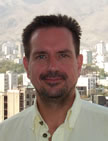
Prof. Gordon Stüber Georgia, Institute of Technology, USA
Dr. Gordon L. Stüber received the B.A.Sc. and Ph.D. degrees in Electrical Engineering from the University of Waterloo, Ontario, Canada, in 1982 and 1986 respectively. Since 1986, he has been with the School of Electrical and Computer Engineering, Georgia Institute of Technology, where he is currently the Joseph M. Pettit Professor in Communications. Dr. Stüber’s research interests are in wireless communications and communication signal processing. He has over 240 refereed publications in journals and conferences in these areas. He is author of the textbook Principles of Mobile Communication, Kluwer Academic Publishers, 1996, 2/e 2001. He was co-recipient of the Jack Neubauer Memorial Award in 1997 recognizing the best systems paper published in the IEEE Transactions on Vehicular Technology. He became an IEEE Fellow in 1999 for contributions to mobile radio and spread spectrum communications. He received the IEEE Vehicular Technology Society James R. Evans Avant Garde Award in 2003 “for his contributions to theoretical research in wireless communications” and the IEEE Vehicular Technology Society Outstanding Service Award in 2005. Dr. Stüber served as Technical Program Chair for the 1996 IEEE Vehicular Technology Conference (VTC’96), Technical Program Chair for the 1998 IEEE International Conference on Communications (ICC’98), General Chair of the Fifth IEEE Workshop on Multimedia, Multiaccess and Teletraffic for Wireless Communications (MMT’2000), General Chair of the 2002 IEEE Communication Theory Workshop, and and General Chair of the Fifth International Symposium on Wireless Personal Multimedia Communications (WPMC’2002). He is a past Editor for Spread Spectrum with the IEEE Transactions on Communications (1993-1998), and a past member of the IEEE Communications Society Awards Committee (1999-2002). He is currently an elected member of the IEEE Vehicular Technology Society Board of Governors (2001-2003,2004-2006,2007-2009) and an elected member of the IEEE Communication Society Board of Governors (2007-2009).
2006
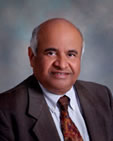
Prof. Vijay Bhargava, University of British Columbia, British Columbia, CA
Vijay K. Bhargava received his B.Sc., M.Sc. and Ph.D. degrees from Queen’s University, Kingston, Ontario in 1970, 1972 and 1974 respectively. Vijay has held regular/visiting appointments at the Indian Institute of Science, University of Waterloo, Concordia University, Ecole Polytechnique de Montreal, UNIDO, NTT Wireless Communications Labs, Tokyo Institute of Technology, University of Indonesia, the Hong Kong University of Science and Technology and the University of Victoria. From 1984 to 2003 he was a professor at the University of Victoria and served as the Founding Graduate Advisor of the department of Electrical and Computer Engineering. Currently he is a professor and Head of the Department of Electrical and Computer Engineering at the University of British Columbia. Vijay served as the Founder and President of “Binary Communications Inc.” (1983-2000). He has provided consulting services to several companies and government agencies. He is a co-author (with D. Haccoun, R. Matyas and P. Nuspl) of “Digital Communications by Satellite” (New York: Wiley 1981), a coeditor (with S. Wicker) of “Reed Solomon Codes and their Applications” (IEEE Press 1994) and a co-editor (with V. Poor, V. Tarokh and S. Yoon) of “Communications, Information and Network Security” (Kluwer: 2003). He serves as an Editor for the IEEE Transactions on Wireless Communications. As a Fellow of the IEEE, the Engineering Institute of Canada (EIC), the Royal Society of Canada, and the Canadian Academy of Engineering, Vijay has been honoured many times by his colleagues. Amongst these awards are the IEEE Centennial Medal, A.F. Bulgin Premium of IEE, U.K., the John B. Stirling Award of the EIC, the Applied Science and Engineering Gold Medal from the Science Council of British Columbia, IEEE Canada’s McNaughton Gold Medal, IEEE Larry K. Wilson Transnational Award, the IEEE Harden Pratt Award, the IEEE Millennium Medal, the IEEE Graduate Teaching Award, the IEEE VTC Avant-garde award and the Eadie Medal of the Royal Society of Canada. He was also awarded a Tier I Canada Research Chair in 2001, which he held until 2003. Vijay is very active in the IEEE and has served as the President of the Information Theory Society, Vice President for Regional Activities Board, Director of Region 7, Montreal Section Chair and Victoria Section Chair. Currently he is a member of the Board of Governors of the IEEE Communications Society. He was nominated by the IEEE BoD as a candidate for the office of President-Elect in 1996 and 2002. His Research Interests include Digital Communications, Error Correcting Codes, and Systems and Technologies beyond IMT 2000.
Prof. J. Robert B. de Marca, CETUC, Pontifical Catholic University, Rio de Janeiro, BRAZIL
2005
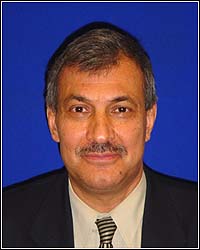
Prof. Hamid Aghvami, King’s College, London, UK
Hamid Aghvami joined the academic staff at King’s in 1984. In 1989 he was promoted to Reader and Professor in Telecommunications Engineering in 1993. He is presently the Director of the Centre for Telecommunications Research at King’s. Professor Aghvami carries out consulting work on Digital Radio Communications Systems for both British and International companies. He has published over 400 technical papers and given invited talks all over the world on various aspects of Personal and Mobile Radio Communications as well as giving courses on the subject world wide. He was Visiting Professor at NTT Radio Communication Systems Laboratories in 1990 and Senior Research Fellow at BT Laboratories in 1998-1999. He was an Executive Advisor to Wireless Facilities Inc., USA in 1996-2002.
He is the Managing Director of Wireless Multimedia Communications LTD (his own consultancy company). He leads an active research team working on numerous mobile and personal communications projects for third and fourth generation systems, these projects are supported both by the government and industry. He was a member of the Board of Governors of the IEEE Communications Society in 2001-2003 He is a distinguished lecturer of the IEEE Communications Society. He has been member, Chairman, Vice-Chairman of the technical programme and organising committees of a large number of international conferences. He is also founder of the International Conference on Personal Indoor and Mobile Radio Communications (PIMRC). He is a Fellow of the Royal Academy of Engineering, Fellow of the IEE and Fellow of the IEEE.
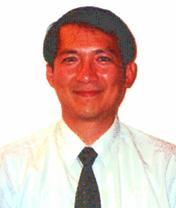
Dr. Justin Chuang, Broadcom, USA
Justin C-I Chuang received the BS degree (1977) from National Taiwan University and the MS (1980) and Ph.D. (1983) degrees from Michigan State University, all in Electrical Engineering.
From 1979 to 1982, he conducted thesis research on transient electromagnetics for radar target discrimination. From 1982 to 1984, he was with GE Corporate Research and Development,Schenectady , NY, where he studied personal and mobile communications. From 1984 to 1993, he was with Bellcore (now Telcordia technologies), Red Bank, NJ, as a member of Radio Research Department. At Bellcore, Dr. Chuang’s work on delay-spread effects, low-complexity modem design and radio resource management led to key system parameter specifications in the Personal Access Communications System (PACS), a personal communications system standard.
From 1993 to 1996, he was with the Electrical and Electronic Engineering Department of the Hong Kong University of Science and Technology (HKUST), where he established the teaching and research program in wireless communications. From 1996 to 2001, he was with AT&T Labs – Research in New Jersey, having worked on creating technologies to provide reliable services on wireless platforms and served as Division Manager, Wireless Communications Research during 2000-2001. He was Chief Scientist of Mobilink Telecom, Inc., from 2001 until it joined Broadcom Corporation in 2002, where he is a Senior Director, Engineering, located in Matawan New Jersey. His team is involved in providing reliable communications protocol software and platform supports for Broadcom’s mobile communications chip sets for current and future cellular systems.
Dr. Chuang has published broadly on various aspects of wireless communications, including radio techniques, system architecture, resource management, and prototype implementation. He was the Area Editor of Wireless Communications for the IEEE Transactions on Communications from 1999 to 2000. From 1996 to 1998, he served as the Chair of the Technical Committee on Personal Communications of the IEEE Communications Society. He was elected an IEEE Fellow in 1997, for contributions to radio link techniques, system architecture, and resource management of low power wireless personal communications and is a member of Phi Kappa Phi. He gave ComSoc Distinguished Lecture series on high-speed wireless data for Internet applications.
His paper, “The effects of time delay spread on portable radio communications channels with digital modulation,” IEEE Journal on Selected Areas in Communications, special issue on Portable and Mobile Communications, June 1987, was selected as one of the 57 IEEE COMSOC GREATEST PAPERS FROM PAST 50 YEARS, as part of the its fiftieth anniversary celebration of the IEEE Communications Society (ComSoc) in 2002.
2004
Prof. Steve Rappaport, State University of New York, USA
Stephen S. Rappaport (IEEE M’65-SM’76-F’87) received the B.E.E. degree from the Cooper Union, New York City, in 1960; the M.S.E.E. degree from the University of Southern California, Los Angeles, in 1962; and the Ph.D. in Electrical Engineering from New York University, New York City, in 1965. He is a Fellow of IEEE, Leading Professor Emeritus of Electrical & Computer Engineering at the State University of New York at Stony Brook, and an IEEE Communications Society Distinguished Lecturer. Dr. Rappaport has numerous technical publications on communications systems and techniques, multiple access, cellular and non-cellular mobile radio networks and systems, queuing, communications traffic, and spread spectrum. His research has received substantial funding from the U.S. National Science Foundation and the U.S. Office of Naval Research. He holds two patents on channel borrowing schemes for cellular communications. In 1995 he received the MOUNTBATTEN PREMIUM from the Institution of Electrical Engineers, (UK), for his paper, “Blocking, hand-off and traffic performance for cellular communication systems with mixed platforms.” He has been on the Editorial Board of IEEE Communications Magazine, the IEEE Transactions on Communications, and the Wireless Networks Journal. He was Guest Editor of the IEEE Journal on Selected Areas in Communications for a special issue on Portable and Mobile Communications and Guest Editor of WINET for a special issue on Performance Evaluation Methods for Personal and Mobile Communications. He served as Technical Program Vice-Chair of IEEE 1998 International Conference on Universal Personal Communications. Listings include: American Men & Women of Science, Who’s Who in America, Who’s Who In the East, Who’s Who In Technology Today, and Who’s Who in Science and Engineering. Prof. Rappaport’s experience includes Technical Staff positions at Hughes Aircraft Company and at Bell Telephone Laboratories as well as consulting for industrial firms. In Spring 1989 he was a Visiting Senior Research Scientist at Columbia University’s Center for Telecommunications Research. At SUNY-Stony Brook he has served on a wide variety of University, College, and Departmental Committees. He is an active member of the IEEE Communications Society and the Long Island Section. His service includes: IEEE Communications Society’s Board of Governors (elected member); Chairman of IEEE Communications Society’s Technical Committee on Personal Communications; Chairman, Technical Committee on Data Communications Systems; Nominations and Elections Board; Awards Board; Fellow Evaluation Committee; National Chairman for Universities on the Member Activities Council; Associate Editor for the IEEE Transactions on Communications; Communications Society Conference Board; elected member of Advisory Council; Technical Affairs Council; Chairman, Long Island Section Award Nominations Committee; First Vice-Chair, Long Island Section; Treasurer, Long Island Section; Chairman, L.I. Communications Society Chapter; Associate Editor, Communications Magazine; and Technical Program Committees for major conferences and workshops.
2003
Prof. Ramjee Prasad, University of Aalborg, Denmark
Ramjee Prasad (SM’90) is research director of the Department of Communication Technology, Aalborg University, Denmark, and holds the chair of Wireless Information Multimedia Communications. He has published over 500 technical papers, and authored and co-edited 13 books. His research interest lies in wireless networks, packet communications, multiple access protocols, adaptive equalizers, spread-spectrum CDMA systems, and multimedia communications. He is a fellow of the IEE, a fellow of IETE, a member of NERG, and a member of the Danish Engineering Society.
2002
Prof. Elvino S. Sousa, University of Toronto, Canada
Elvino S. Sousa (S?9-M?0-SM?6) received the B.A.Sc. degree in engineering science and the M.A.Sc. degree in electrical engineering from the University of Toronto, Canada, in 1980 and 1982, respectively. He received the Ph.D. degree in electrical engineering from the University of Southern California, Los Angeles, in 1985. Since 1986, he has been with the Department of Electrical and Computer Engineering at the University of Toronto where he is now a Full Professor. Since 1983, he has performed research in spread spectrum systems. His current interests include the areas of high-speed CDMA systems, software radio, and ad hoc networks. He is Director of the wireless lab, University of Toronto, which has undertaken research in CDMA wireless systems for past 15 years. He has been invited to give lectures and short courses on spread spectrum, CDMA, and wireless communications in a number of countries. He has spent sabbatical leaves at Qualcomm and Sony CSL, where he was the holder of the Sony Sabbatical Chair. Currently, he is the holder of the Bell University Labs (BUL) Chair in Computer Engineering with a mandate for research in wireless computing and the principal investigator in the BUL Mobile Computing Lab. Dr. Sousa was the Technical Program Chairman for PIMRC 95 and Vice- Technical Program Chair for Globecom?9.
Prof. Imrich Chlamtac, University of Texas at Dallas, USA
Imrich Chlamtac (M?6-SM?6-F?3) received the Ph.D. degree in computer science from the University of Minnesota, Minneapolis. Since 1997, he holds the Distinguished Endowed Chair in Telecommunications at the University of Texas at Dallas (UTD), Richardson, on joint CS and EE appointment. He holds the titles of Sackler Professor at Tel Aviv University, Israel, Bruno Kessler Honorary Professor at the University of Trento, Italy, and University Professor at the Technical University of Budapest, Hungary. Currently on leave from UTD, he is President of CreateNet, an international nonprofit research organization based in Europe, consisting of over two dozen universities, research centers, and member companies, including the University of Trento, Politecnico di Torino, Technical University of Berlin, Technion The Israel Institute of Technology, the Technical University of Budapest, ICT-IRST, CNR, Microsoft, HP, Nokia, EM, Lucent, Marconi, and other industry leaders. He has published over 300 refereed articles and is the co-author of the first textbook on Local Area Networks (Lexington Books, 1981, 1982, 1984) and of Mobile and Wireless Networks, Protocols and Services (New York: Wiley, 2000), an Amazon.com bestseller and IEEE Network Magazine Editor’s choice. He is the founding Editor-in-Chief of the ACM-URSI-Baltzer Wireless Networks (WINET), the ACM-Baltzer Mobile Networking and Nomadic Applications (MONET) journals, and the SPIE/Kluwer Optical Networks (ONM) Magazine. He is the co-founder and past President of CONSIP and BCN corporations. Dr. Chlamtac is a Fellow of the ACM Society, a Fulbright Scholar, and an IEEE Distinguished Lecturer. He is the winner of the 2001 ACM Sigmobile annual award and the IEEE ComSoc WTC 2002 award for contributions to wireless and mobile networks, and recipient of multiple best paper awards in the areas of wireless and optical networks.






